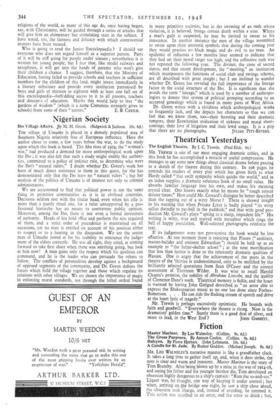Theatrical Yesterdays
The English Theatre. By J. C. Trewin. (Paul Elek. 6s.)
MR. TREWIN is one of our most engaging dramatic critics, and in this book he has accomplished a miracle of useful compression. He manages to say some new things about classical drama before passing to a sketch of the theatre during this century. In 1o6 pages he reminds his readers of every play which has given birth to what Hardy called " that swift sympathy which quicks the world," and in an index supplies a dramatic reference book of no small value. He absorbs familiar language into his own, and makes his meaning crystal clear. One knows exactly what he means by "rough roister doister farces." How could Mr. Coward's dialogue be better described than the tapping out of a witty Morse ? There is shrewd insight in his warning that when Private Lives is badly played "its witty sallies dwindle to pat-ball in the paddock," and that with good pro- duction Mr. Coward's plays " spring to a sharp, impudent life." His writing is witty, wise and starred with metaphor which rings the bell of happy association. Well-selected photographs reinforce the text.
If its judgements were not provocative the book would be less effective. At one moment there is rejoicing that Pinero (" architect, master-builder and eminent Edwardian ") should be held up as an example to " the helter-skelter school " ; at the next mortification that less than justice is done to the inherently dramatic qualities of Hassan. One is angry that the achievement of the poets in the theatre of the 'thirties is underestimated, only to be mollified by the brilliantly selected quotations from Sean O'Casey and the correct assessment of Thornton Wilder. It was wise to recall Harold Chapin's promise, the nobility of Abraham Lincoln, and the quality of Clemenee Dane's work. Theatrical memory is fickle, and the heart is warmed by having John Gielgud described as " an actor able to express the Shakespearian music as no one has done since Forbes- Robertson. . . . He can ride the flashing stream of speech and drive at the heart lyric of tragedy."
Mr. Trewin is perhaps excessively optimistic. He bounds with faith and goodwill. "Everywhere the theatre is rising. Now is the dramatists' golden time." Surely there is a good deal of silver, and
more to lead, in the West End ? Joint GARRETT.,


































 Previous page
Previous page